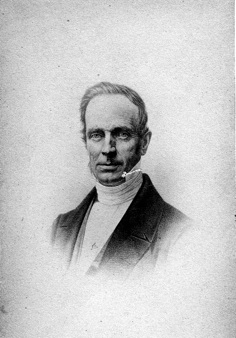MAGLTGreenwood
THOMAS JEFFERSON GREENWOOD 1799-1874

- MM 1826, Pentucket
- Affiliated 1859 Mount Vernon
- Grand Chaplain 1862
- DDGM, District 11, 1863
BIOGRAPHY
From Proceedings, Page 1873-368:
REV. THOMAS JEFFERSON GREENWOOD, MALDEN, Universalist. 1862.
Brother Greenwood was born in Newton, Mass., he being the youngest child of Miles and Charity B. Greenwood, May 2, 1799, where his earliest days were spent. In a few years the family removed to Watertown, where his parents eventually died. His scholastic education was derived from the common schools of the town, with the exception of about two years (1813, 1814) passed in a private school in Albany, N. Y.
In the active business of his early life he was engaged in cotton manufacturing, — his own hand placing the first lock of cotton to the machinery of the first cotton factory started in Waltham. In the business of manufacturing he continued during the early years of his life.
In 1820 Mr. Greenwood was married to Eliza M. Burroughs, then resident in Waltham, a grand-daughter of Jonathan Webster, Esq., of Haverhill, well and widely known in revolutionary times, as the compatriot and associate of the Hancocks and Adamses of those days. With her he has enjoyed the happiness of celebrating, in 1870, their golden wedding. In 1823 he removed to East Chelmsford — now the City of Lowell — to engage in superintending a small cotton manufacturing establishment, owned by Thomas Hurd, Esq., and known as "Hurd's Mills." In about a year from this time he became an "overseer," in the employ of the Merrimack Corporation, which, with its kindred associations, has grown into one of the largest and most flourishing manufacturing cities in the world.
The first public address ever attempted by Mr. G. was in advocacy of Gen. Andrew Jackson for the office of President of the United States. During his residence in Lowell two rival military companies were organized, to one of which he had the honor of giving its baptismal name, the Mechanic Phalanx, and of receiving, as "ensign" of the company, from the hands of the ladies of the town, an elegant standard, accompanied by an eloquent address from one of their number. Subsequently, and for three years, he was commander of the company; and it is just to say that, from the first year of its organization down to the present time, it has borne the reputation of being one of the best drilled and most efficient military organizations in the State. Bro. G. continued to reside in Lowell until 1829, when an important change in the course of his life took place.
For many years, in Christian faith a Universalist, and strongly attached to the principles involved, he had formed the purpose of entering the Christian ministry. His thoughts and reading had long been in that direction. On Sunday, July 16, 1829, he preached his first sermon in Atkinson, N. H. In the month of June, 1830, he was ordained as pastor of the Universalist Society in Marlborough, where he remained fourteen years. From Marlborough, in 1844, he removed to New London, Conn., to the care of the Universalist Church in that city, and remained five years. From thence he went to Dover, N. H., in 1849, where he remained as pastor ten years; thence, in 1859, to Maiden, where his pastorate continued about six years, and where he still resides, having during the past eight years been the non-resident pastor of the Universalist Society in Saugus, to which he now ministers.
During the residence of Bro. G. in Marlborough, he was twice elected to a seat in the Senate of Massachusetts, to wit, in 1840 and 1843. And during his residence in Maiden he has been twice nominated as a candidate for a seat in the Congress of the United States, though not elected.
The connection of Bro. G. with the Masonic Fraternity has been of long standing. He was initiated into the mysteries of the Craft as far back as 1825, spanning nearly half a century; making him one of the oldest Masons in the State. The three Cardinal Degrees were conferred on him by Pentucket Lodge, in East Chelmsford, now Lowell; the Royal Arch Degrees in Belknap Chapter R.A.M., in Dover, N. H.; the Degrees from thence to Knight Templar, in Palestine Commandery, in New London, Conn., in August, 1859; the Degrees of Royal and Select Master, in Boston, 1860; and the Degrees of the Lodge of Perfection in Portsmouth, N. H., and Boston, Mass.
In 1862 he was appointed Chaplain of the Grand Lodge of Massachusetts, by M.W. William T. Coolidge, and the year following District Deputy Grand Master for District No. 11. Soon afterward a contemplated removal from the State led to a resignation of the commission, which was duly accepted. The removal, however, did not take place.